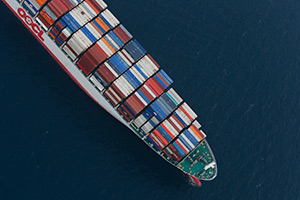Flexport Wants to Be the Uber of Ocean Freight

Ryan Petersen came up with a quality-control feint when he was working in China for his brother's import business. During a factory tour he'd excuse himself to go to the bathroom, to see if there was tap water or flush toilets.
No? He'd scratch the plant from his list of potential manufacturers, because it lacked sufficient industrial finesse. Petersen says he learned a lot of similar tricks in the two years he lived in Shanghai and Kunming. He also picked up Mandarin, and a serious frustration with what he views as the unnecessarily hassle-heavy business of freight forwarding.
Nine years, an MBA and one successful business later, Petersen, 34, is CEO of Flexport Inc. His billboard description: It's the world's first licensed customs brokerage built around a modern Web application.
"The world wants software to manage their business," Petersen said. "They're used to using software to do everything, and then all of a sudden they've got to move their freight."
Flexport, which has raised $6.6 million from investors, including Google Ventures and actor Ashton Kutcher's fund, is another startup looking to muscle in on an established industry. Uber Technologies Inc. is changing the way people move around cities; Flexport wants to do the same with cargo in the holds of ocean-going containerships.
Flexport connects customers with carriers, and software takes care of customs, tariffs and other logistics. A Web-based dashboard lets a U.S. importer comparison-shop by typing in variables — Port A on this day or Port B on this one, railcar versus tractor-trailer — and displays price-quotes from transport companies.
Flexport, Petersen says, cuts down on paperwork and headaches for importers, like booking sites do for travelers. It's one of the first freight-forwarding outfits to digitize international shipping, making it easy to move goods through customs and around the world.
If the 2-year-old effort succeeds, "there will be more international trade because of Flexport, and international trade is a very big thing for there to be more of," says Paul Graham, co-founder of Y Combinator, the startup factory that has discovered, schooled and helped finance more than 700 companies, including Airbnb Inc. and Dropbox Inc. Flexport's a Y Combinator graduate, class of 2014.
By most any measure, the odds are against it. For one thing, the majority of startups fail. And Bill Trenchard, a partner at First Round Capital, says traditional freight forwarding is a challenging business to scale. The Big Three are DHL Supply Chain and Global Forward, Kuehne and Nagel and DB Schenker Logistics, which together generated revenue of $73.6 billion in 2013. First Round backed Flexport anyway. Trenchard says if anyone can make it work, it's probably Petersen.
"This is a tremendously hard business to execute as there are so many moving parts," Trenchard says. "They need to be a great tech, logistics and services company all at the same time. Few entrepreneurs can pull this off while rapidly scaling. I think Ryan is uniquely suited to the challenge."
Petersen was a 17-year-old high school senior in Bethesda, Maryland, when he first got into the import-export game, with his brother David, who was studying computer science at the University of Maryland. They would buy things from China — knives, scooters, all-terrain vehicles — and sell them for a profit on eBay.
"It was way better than some of the other stuff my high school friends were getting into," Ryan says.
Their mother lent them $15,000 to get started, and he says they were at one point moving millions of dollars in merchandise a month. David and a friend, Michael Kanko, turned the project into a company called KPX.
They also built about 40 single-brand e-commerce sites — one for electronic shiatsu massage chairs, one for wood chippers, one for motor parts and so on, mostly made in China. One of the big hits was Wasauna, now one of the largest importers of walk-in bathtubs in the United States.
Ryan joined KPX in 2002, fresh from the University of California, Berkeley, with an economics degree, and moved to the world's second-largest economy to get closer to the source. It also allowed him to bring to four the number of foreign languages in which he's proficient; the others are Spanish, Portuguese and French.
"Our competitive advantage, if there ever was one, is that we were able to manage the complexity of moving freight," he says.
In 2007, when Petersen was at Columbia University getting his MBA, the brothers founded ImportGenius with Kanko to share the wealth, and generate more for themselves. It charges $200 a month and has about 4,500 subscribers who can tap a database of 380 million historical shipping manifests and software that keeps track in real-time of every shipment of goods entering the United States and other countries. Petersen says clients include investment banks and hedge funds and three of the world's biggest logistics companies.
Ryan founded Flexport together and David peeled off to co-found BuildZoom Inc., an online marketplace for remodeling and construction contractors that also get its start via Y Combinator.
Flexport has 31 employees and offices in San Francisco's SOMA district, which is where a lot of startups rent office space. And about half of its customers are other startups, including Bellabeat, which makes wearable tracking devices. When Morena Simatic, Bellabeat's chief operating officer, needed to ship a ton of lumber from Croatia to Las Vegas to build a booth for the Consumer Electronics Show, she logged on to Flexport's website.
"Everything was being done a few days before Christmas, it was super hard to organize everything," Simatic said. "I don't know how they did it, but they did it."

